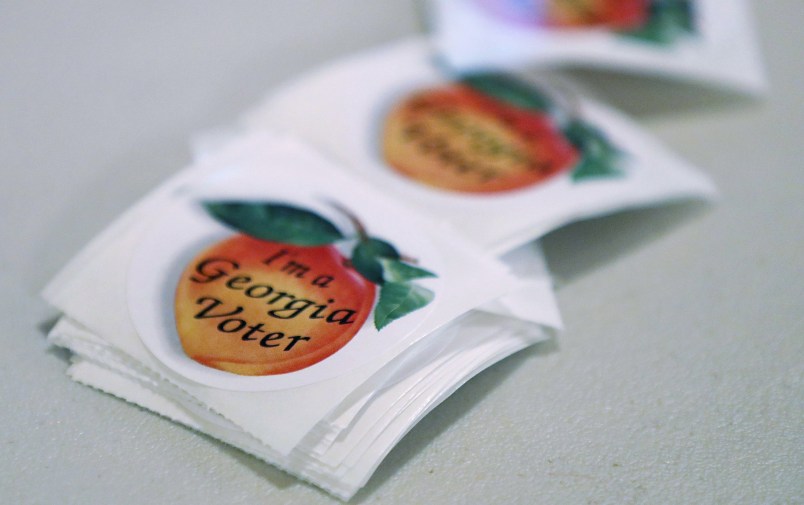ATLANTA (AP) — Election officials in some Georgia counties waited too long to send out absentee ballots for the state’s Dec. 4 runoff election, so the deadline for returning those ballots should be extended, the Georgia Democratic Party argues in a new federal lawsuit.
A spokeswoman for the secretary of state’s office countered on Friday that any blame lies with the Democrats, whose lawsuits delayed certification of the general election’s results.
Results of the Nov. 6 election were finally certified on Nov. 17, but at least 65 of the state’s 159 counties didn’t send out absentee ballots for the runoff until this week, according to the lawsuit filed Thursday. That leaves some would-be absentee voters with only a week to get their ballots back to elections officials.
There are two statewide races on the runoff ballot — secretary of state and a seat on the Public Service Commission. Runoff elections in Georgia are triggered when no candidate wins more than 50 percent of the vote.
The lawsuit was filed against interim Secretary of State Robyn Crittenden in her official capacity as the state’s top elections official. A statement from her spokeswoman, Candice Broce, says Crittenden and her staff worked as quickly as they could, but some counties took longer because they lack the capacity to print their own ballots.
“All parties involved — the Secretary of State’s office, the counties, and the vendors — worked as expeditiously as possible to prepare absentee ballots for the run-off. The insinuation that the Democratic Party makes in its complaint that any party involved in this process was not working as quickly as possible is completely false,” she said.
The state Democratic Party voter protection hotline received calls from voters seeking help getting absentee ballots they had applied for, the lawsuit says. It is the latest in a series of federal lawsuits filed before and after the general election raising concerns about how and whether the state counts certain ballots.
Generally, absentee ballots must be received by Election Day to be counted. The lawsuit asks a judge to order that absentee ballots postmarked by Dec. 4 and received by Dec. 7 be counted. It also asks that the secretary of state be prohibited from certifying the election results until she has confirmed that those ballots have been counted.
Georgia law says county officials have to send absentee ballots to eligible applicants for a runoff election “as soon as possible” after the results of the general election are certified, the lawsuit says.
Data from the secretary of state’s office shows that five counties began sending out absentee ballots on Nov. 19, the first business day after the general election results were certified, the lawsuit says. Several others sent out absentee ballots on Nov. 20 or 21.
But 44 counties didn’t send out absentee ballots until Nov. 26, and 21 more waited until Nov. 27, the lawsuit says.
“This has and will result in arbitrary and disparate treatment of voters who seek to exercise their respective rights to vote via absentee mail-in ballot, based solely on their county of permanent residence,” the lawsuit says.
The number of people affected is not insignificant, the lawsuit says, noting that 283,839 people requested absentee ballots in the general election and at least 121,301 people had submitted applications for absentee ballots for the runoff election.
Overseas and military absentee ballots already are considered valid if they’re postmarked by Election Day and received within three days after that, so extending that deadline to other absentee ballots would not be overly burdensome for election officials who have until Dec. 10 to certify their election results, the lawsuit argues.
If that solution is not adopted, state Democratic Party chairman Dubose Porter said in a statement submitted with the lawsuit, some Georgia citizens “will lose their fundamental right to vote, because their ballots will have been sent to them too late to cast a ballot that will be counted.”







Talk about burying the lede. California has 58 counties and 40 million people. Georgia has 159 counties and 10 million people. County clerks are notorious for running side businesses and grifty behavior. The nonfeasance of clerks in this instance hardly surprises as lower turnout supports a GOP victory. Self-interest in action (inaction?).
So Voters are responsible for errors the State Elections office make?
Just another way of committing voter fraud!
When government officials decide to not be flexible and do a simple logical thing they already have the mechanism for (because of military ballots) it is obvious they are putting their finger on the scale, and this is no doubt only one way they did it. Particularly of course in a state with a hundred year plus record of doing everything possible to not allow a large percentage of its citizens to vote.
Lie, cheat, steal and repression…all the rethugs have going for them
Reprehensible. Blaming the voters !!!
A day or two is plausible, even if it was known long before certification that that race was headed for a runoff. A week?
It’s a sign of the state’s corruption that they’re not (yet) bothering to ask for criminal sanctions as well.